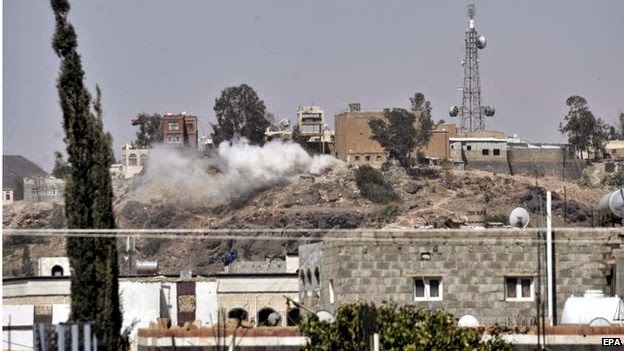When Egyptians rose up against their government three years ago, it wasn’t just dictator Hosni Mubarak’s reign that crumbled. The mass protests, political instability, and now, increasingly frequent terrorist attacks, have devastated Egypt’s once-thriving tourism sector.
For many Egyptians still working in the industry today, there is only one answer to their problems: Gen. Abdel-Fattah el-Sissi, who is gearing up for a likely presidential bid and is seen as a leader who will bring back security to businesses.
"Sissi is the only man who can solve Egypt’s problems," said Emad Nour, a third-generation shopkeeper in Cairo’s sprawling Khan el-Khalili bazaar, where tourists used to flock before the unrest began. "He can fix the security problem here."
Nour once made a decent living making intricate tables, traditional lamps and other handmade items that often attract tourists. But nowadays he, like many other vendors, has barely anyone coming to his shop.
"We depend on tourism," he said with dismay. "If there are no tourists, our lives are not good." Lots of stores around him have closed down, he said, adding that many shop owners have given up and changed professions entirely.
At Cairo’s ancient Giza Pyramids, which used to be swarming with foreigners, desperate vendors and guides with skinny horses now harass the occasional straggling tourists. Buses carrying tourists from the capital to resort towns along the Red Sea now travel in armed convoys through the restive Sinai, where hardline militants have launched a campaign against security forces. Once bustling hotels and youth hostels are eerily quiet.
From 2009 to 2010, before the revolution, Egypt took in $11.6 billion from tourism,
according to Reuters. But 2012 to 2013 were marked by a devastating dip in tourism, with Egypt only earning $9.75 billion from the industry. Following the military's ouster of Islamist President Mohammed Morsi last year, tourism fell by a whopping 45 percent, Tourism Minister Hisham Zaazou told Reuters.
Under the military-backed government, unrest has surged. In recent weeks alone,
gunmen assassinated a top government figure, a jihadist group targeted security forces in Cairo with
four bombs, and dozens of anti-government protesters have been killed in clashes with police.
On Jan. 29, the U.S. Embassy in Cairo
urged its citizens to "limit their movements to the near vicinity of their neighborhoods," warning against traveling outside of Egypt’s cities by car. And many governments, like the
United States and the
United Kingdom, have issued travel alerts for Egypt.
Thousands of dissidents have been
imprisoned, and rights groups and critics have slammed the interim government as repressive and increasingly authoritarian. Yet despite a heavy-handed crackdown on what the state has labeled a "war on terrorism," many Egyptians, especially those working in tourism, say forceful rule is the only way to restore security.
"We need a man who can stabilize everything," said Abdel Rahman Aly, a tourism company owner. "I’m against a man with a military background, but there is no one else."
In Egypt, Sissi is portrayed as a national hero. Posters bearing his face are plastered everywhere. Pro-government protesters who rallied on Jan. 25, the three-year anniversary of the revolution, didn’t chant revolutionary slogans of "bread, freedom, and social justice." Instead, they wore Sissi masks and praised the military leader for cracking down on violence.
"This man is an idol," Aly said. "If that works for everyone else, that works for me."
Aly says the only reason his company is still afloat is because he has started coordinating international trips for Egyptians, having largely given up on foreigners coming to the country. But with military checkpoints everywhere and a very real fear of terrorist attacks, the success of even this venture seems improbable.
Unlike Aly, some have their doubts that Sissi can up live to the expectations of his cult-like followers.
"The notion that Sissi can curb terrorist attacks is odd in my view," said Shadi Hamid, a Middle East analyst and fellow at the Brookings Institution’s Saban Center. "Under Sissi, over the last seven months, terrorist attacks have increased significantly. Brute force seems to be his approach to dealing with things -- but that’s not how you defeat terrorism."
Dr. Kareem Eltamamy, the owner of Dahab Hostel, a once bustling youth hostel just a short walk from Tahrir Square, agrees with that sentiment.
"If Sissi became president, the Muslim Brotherhood or whoever is making these explosions will just become more angry," he said, mirroring popular consensus that the Islamist group is behind the attacks, even though a Sinai-based jihadist group has claimed responsibility for most of the recent terrorist attacks across Egypt.
Eltamamy said his hostel, which is widely known among backpackers and budget travelers in Egypt, doesn't come close to reaching capacity on a good day. He describes the past few months in a single word: "hell." Unlike many Egyptians who wholly believe in Sissi’s promise to quell the violence, he doesn’t think the current security situation, or the tourism sector, will turn around anytime soon.
But after three years of tumult, he said he doesn’t know how it could get much worse.
Eltamamy recently poured money into remodeling his hostel, hoping to draw in tourists from the "adventurous" crowd he says now occasionally comes through. But so far, it hasn’t helped.
"Nobody wants to go to a country that is exploding," he said with a sigh.





